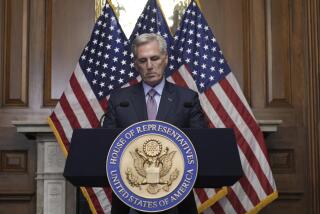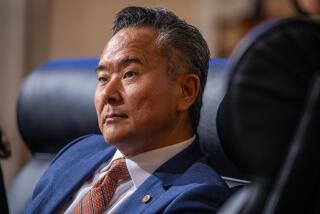John J. McFall, 88; Former Congressman Reprimanded in ‘70s Influence Scandal
- Share via
John J. McFall, the San Joaquin Valley congressman who served 11 terms before ethics questions doomed his career, died March 7. He was 88.
McFall died at a hospital in Virginia of complications from a broken hip and Parkinson’s disease.
A conservative Democrat, McFall was elected to Congress in 1956. As a member of the defense appropriations subcommittee, he supported U.S. policies on the Vietnam War during the Johnson and Nixon administrations. More important to his district, he later became chairman of the House appropriations subcommittee on transportation.
“I’ve put a dam or project on every stream in [my] congressional district,” McFall told the Modesto Bee some years ago.
And that wasn’t much of a stretch. Projects he championed include the New Melones Dam on the Stanislaus River and the New Hogan Dam on the Calaveras River. He was also able to steer funding for Amtrak service in California.
His career seemed on the ascent in the 1970s. He was appointed party whip, the third-ranking Democrat in the congressional leadership, in 1973. But after losing a bid for majority leader in 1976, his congressional career began its decline.
He was linked to Tongsun Park, a South Korean businessman at the center of an influence-buying scandal. By October 1978, the House voted to reprimand three California congressmen, including McFall, for their financial dealings with Park. McFall was cited for his failure to report a $3,000 contribution from Park.
McFall viewed the reprimand, a relatively light congressional action, as “completely vindicating” his actions in the Park matter.
“I feel my reputation for integrity and honesty have been upheld by the committee action,” McFall said.
But voters in his district saw it differently, a month later electing Norman Shumway, whom the Modesto Bee once characterized as “a lackluster San Joaquin County supervisor,” as congressman.
Born in Buffalo, N.Y., in 1918, McFall was raised on his grandparents’ farm in Manteca, Calif., after his father died in World War I. He graduated from Modesto Junior College and UC Berkeley before entering Boalt Hall, Berkeley’s law school. He was admitted to the California bar in 1941.
He briefly worked as a lawyer in Oakland before serving in an Army intelligence unit stateside during World War II. After being discharged, he returned to Manteca and began a law practice. He served as city councilman and mayor before being elected to the California Assembly, where he served from 1951 to 1956.
After leaving Congress, he worked as a lobbyist in Washington for the U.S. Railway Assn. He retired in 1987.
He is survived by three children and a grandchild.
More to Read
Get the L.A. Times Politics newsletter
Deeply reported insights into legislation, politics and policy from Sacramento, Washington and beyond. In your inbox three times per week.
You may occasionally receive promotional content from the Los Angeles Times.










